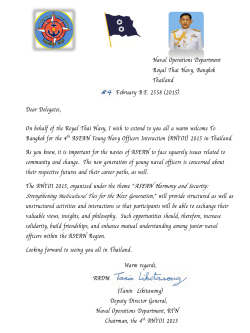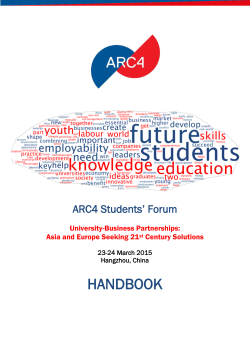
Asian and European University Leaders Gather in China for the
Asian and European University Leaders Gather in China for the Largest ASEM Rectors’ Conference Universities and the business sector can build innovative partnerships Press Release For Immediate Release 19 March 2015 Singapore Media Contact Maria Elena DE MATTEO (Ms) Communications Executive Asia-Europe Foundation (ASEF) E mariaelena.dematteo@asef.org T +65 6874 9746 www.asef.org More Information http://bit.ly/asef-arc4 Over 100 university leaders from Asia and Europe will gather on 26-27 March 2015 in Hangzhou, China for the 4th ASEM Rectors’ Conference (ARC4) themed University-Business Partnerships: Asia and Europe Seeking 21st Century Solutions. This will be the largest ASEM Rectors’ Conference (ARC) since this biennial project was launched in 2008. 47 ASEM member countries will be represented in this Asia-Europe Higher Education Dialogue, which sets another record in the development of ARC. For the first time, Croatia and Kazakhstan, the 2 newest ASEM members, will be participating in this Conference, represented by the Presidents of the countries’ top universities. A few ASEM member countries, which have never participated in ARC, such as Bangladesh, Cyprus, the Lao PDR, Malta, the Russian Federation and Switzerland, will join as well. Ms Mārīte SEILE, Minister of Education and Science of Latvia, will be present at ARC4 to receive the policy recommendations from participants for the 5th ASEM Education Ministers’ Meeting (ASEM ME5), which will be held on 27–28 April 2015 in Riga, Latvia. ARC4 provides a high-level inter-regional dialogue on how the higher education institutions (HEIs) can better collaborate with the business and industry sector to tackle emerging socio-economic issues in Asia and Europe, particularly youth employment, the increasing need for entrepreneurship, and new learning environments through information and communication technologies. Hosted by Zhejiang University, one of China’s top HEIs, ARC4 is coorganised by the Asia-Europe Foundation (ASEF), jointly with the Ministry of Foreign Affairs and the Ministry of Education of the People’s Republic of China. A Students’ Forum will be held in conjunction with ARC4 on 23-24 March in the same venue. Student representatives selected out of over 2,400 applicants from 51 ASEM member countries, will be sharing their ideas on the same topics as those for the Rectors and will later present their suggestions directly to the latter. The previous 3 editions of the ASEM Rectors’ Conference were held in Germany, Korea and the Netherlands respectively. Acknowledged as the Official Dialogue Partner for the ASEM Education Ministers’ Meeting (ASEM ME), ARC directly contributes to the Ministerial discussions. For more information please visit http://bit.ly/asef-arc4 p. 1/2 About the Organisers Co-organised by The Asia-Europe Foundation (ASEF) promotes understanding, strengthens relationships and facilitates cooperation among the people, institutions and organisations of Asia and Europe. ASEF enhances dialogue, enables exchanges and encourages collaboration across the thematic areas of culture, economy, education, governance, public health and sustainable development. ASEF is a not-for-profit intergovernmental organisation located in Singapore. Founded in 1997, it is the only institution of the Asia-Europe Meeting (ASEM). Together with about 700 partner organisations ASEF has run more than 650 projects, mainly conferences, seminars and workshops. Over 17,000 Asians and Europeans have actively participated in its activities and it has reached much wider audiences through its networks, web-portals, publications, exhibitions and lectures. For more information, please visit www.asef.org Ministry of Foreign Affairs of the People's Republic of China Ministry of Education of the People's Republic of China Hosted by Zhejiang University is a comprehensive research university with distinctive features and national as well as international impact. Research at Zhejiang University spans 12 academic disciplines, covering philosophy, economics, law, education, literature, history, art, science, engineering, agriculture, medicine, management, etc.. With 7 faculties and 37 colleges/schools, Zhejiang University has 14 primary and 21 secondary national leading academic disciplines. For more information, please visit www.zju.edu.cn/english/ In Partnership with Created in 1950 under the auspices of UNESCO, the International Association of Universities (IAU) brings together more than 650 institutions and organisations worldwide for exchange and action on common concerns in the area of higher education. For more information, please visit www.iau-aiu.net/ The main objective of the ASEAN University Network (AUN) is to strengthen the existing network of co-operation among leading universities in ASEAN. This is done by promoting co-operation and solidarity among ASEAN scholars and academicians, developing academic and professional human resource, and promoting information dissemination among ASEAN academic community. The network has brought together the ASEAN countries' individual quest for academic collaborations in the identified priority areas that would deepen understanding of the dynamic ASEAN, and accordingly hasten regional identity and solidarity. For more information, please visit www.aunsec.org/ Supported by Chulalongkorn University, the oldest higher education institution in Thailand, was founded in its present form in 1917 by King Vajiravudh (Rama VI). It is named after his father, King Chulalongkorn (Rama V), who laid the foundations for modern education in the country. In keeping with the shared vision of both kings, it has maintained a reputation for academic excellence and been a pillar of the kingdom ever since. Today, it consists of 19 faculties, two teaching institutes, three colleges and 10 institutes, with a total enrolment of more than 40,000 undergraduate and graduate students. For more information, please visit www.chula.ac.th/ Office of Higher Education Commission, Thailand p. 2/2 In the Framework of The Asia-Europe Meeting (ASEM) is an intergovernmental forum for dialogue and cooperation established in 1996 to deepen relations between Asia and Europe, which addresses political, economic and socio-cultural issues of common concern. ASEM brings together 53 members: Australia, Austria, Bangladesh, Belgium, Brunei Darussalam, Bulgaria, Cambodia, China, Croatia, Cyprus, the Czech Republic, Denmark, Estonia, Finland, France, Germany, Greece, Hungary, India, Indonesia, Ireland, Italy, Japan, Kazakhstan, Korea, the Lao PDR, Latvia, Lithuania, Luxembourg, Malaysia, Malta, Mongolia, Myanmar, the Netherlands, New Zealand, Norway, Pakistan, the Philippines, Poland, Portugal, Romania, Russian Federation, Singapore, Slovakia, Slovenia, Spain, Sweden, Switzerland, Thailand, the United Kingdom, and Viet Nam plus the ASEAN Secretariat and the European Union. For more information, please visit www.aseminfoboard.org p. 3/2
© Copyright 2025















